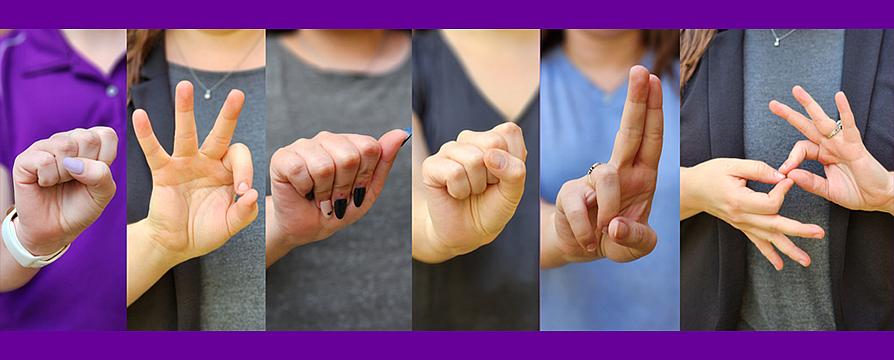Individuals with hearing loss vary greatly on degree of loss and the type of hearing loss experienced. Each person with a hearing loss responds differently to amplification devices (hearing aids, cochlear implants, FM systems), and it is important to consider that not all Deaf/Hard of Hearing people utilize amplification devices and/or ASL interpreters. Disability Services strives to accommodate students with hearing loss on an individual basis to best serve our D/HH campus population.
Hard of Hearing
A person who is hard of hearing is someone with a partial hearing loss and may be able to communicate in a one-on-one setting or in an environment with quiet to moderate background noise. While lip reading is one method of understanding speech visually, only 20% of speech sounds can be lip read. Many individuals with hearing loss will utilize extra environmental cues to decipher spoken language.
Deaf
Persons who are deaf typically have a severe to profound hearing loss and may rely on a visual mode of communication (American Sign Language).
A person with hearing loss may be able to communicate orally (by speech-reading and speaking or by using sign language, or both).
Communicating with Deaf and Hard of Hearing Students
Communication needs vary among people with hearing loss. Although some may use assistive listening devices, rely on lip-reading, or utilize ASL interpreters it is important to consider the following when interacting with a D/HH student.
- Maintain eye contact and ensure adequate lighting for the individual to lip-read.
- Visual resources or written materials can aid in relying your message.
- Speak at a normal rate and volume as over enunciating speech will distort mouth movements therefore making it more difficult to read.
A sign language interpreter may be necessary to convey the oral message to a DHH student. When working with an ASL interpreter address the DHH individual directly. The interpreter uses the student’s preferred mode of communication to ensure communication access. Interpreting services are arranged by the Coordinator of Deaf and Hard of Hearing Services in Disability Services. Students may use ASL interpreters for all academic-related activities and other university sponsored events.
Video Relay Services
Video Relay Services are a form of Telecommunications Relay Service that enables persons with hearing loss who use American Sign Language to communicate with voice telephone users through video equipment, rather than through typed text. VRS is regulated by the Federal Communications Commission to promote access to telecommunications services for people with disabilities.
Some people hang up on Video Relay calls because they think the communications assistant is a telemarketer. If you hear, "Hello. This is the relay service…" when you pick up the phone, please don't hang up! The voice on the phone is a communication assistant (an ASL interpreter) through a TRS provider, to a person who is deaf, hard-of-hearing, or has a speech disability.
Interpreter Request
All requests for an ASL interpreter must be requested through the Coordinator for Deaf and Hard of Hearing Services by submitting the online Interpreter Request Form.
- Deaf/HH students registered with the Office of Disability Services are eligible for interpreting services for all academic and university-sponsored events.
- Departments may request an interpreter using the online request form.
- Members of the public who would like to request an ASL interpreter for a university-sponsored event should contact the department sponsoring the event to request an interpreter.
Requests should be made as far in advance as possible, but at least three business days in advance of the requested date of services. Last-minute requests cannot be guaranteed, though attempts will always be made to secure interpreter/captioning services.
ASL Interpreter Service Provider Information
Apply to become an SFA ASL Interpreter
Qualifications:
- In order to be considered for this position, applicant must apply online. Must include unofficial transcript with application. Supplemental materials may be attached when applying. Must have completed 9 college credit hours, with an overall 2.5 GPA or equivalent experience as an ASL interpreter.
- Graduation from high school or equivalent required; experience is required, evaluation of interpreting skills by Interpreter Coordinator will be completed; must be able to coordinate with the personal and academic schedule of the students with disabilities for whom the services will be provided; ability to establish effective working relations is required, as are patience and courteousness; must be able to maintain confidentiality.
 Axe ’Em, Jacks!
Axe ’Em, Jacks!
